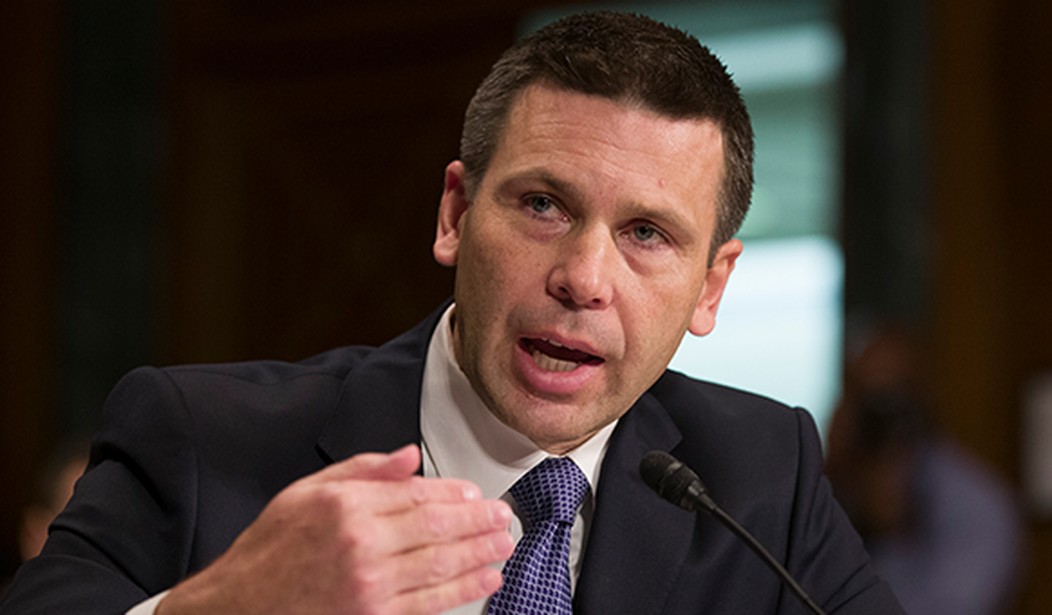Kevin McAleenan, acting secretary for the Department of Homeland Security, said last week that President Donald Trump helped the department remedy the humanitarian crisis at the Southern Border.
In particular, McAleenan emphasized at a Thursday congressional hearing that Trump’s diplomatic outreach with Mexico significantly reduced the number of illegal immigration into the United States.
“Thanks to President Trump’s direct engagement, we’ve entered into an agreement with Mexico in early June to address the migration flows that is making a dramatic impact — a 28 percent reduction in border crossing in June,” McAleenan, who is also the commissioner for U.S. Customs and Border Protection, said.
In May, Trump threatened to impose severe tariffs on Mexico if the country did not take additional steps to reduce Central American migrants transiting through the country in order to reach the United States. As a response, Mexico agreed to mobilize its security force to crack down on the illegal aliens. These efforts, combined with the life-threatening summer weather that deters migrants, led to a sharp reduction in border arrests from 133,000 in May — a 13-year high — to 95,000 in June.
The acting secretary also noted that the White House helped improve the humanitarian conditions at the border facilities by requesting emergency supplemental funds from Congress. The emergency appropriation bill was signed into law on July 2 after Trump first requested the funding on May 1.
Recommended
The additional funding pays for the construction of additional temporary housing facilities, the wages for “surge capacity” officers mobilized to deal with the crisis, medical assistance for migrants, supplies such as food and toiletries, and other items.
“I am confident that no law enforcement agency in the world is providing more critical life-saving care or medical support than U.S. Customs and Border Protection,” McAleenan said.
Reduced migration and increased funding has improved the conditions for the detainees in Border Patrol facilities. McAleenan noted that the Border Patrol now has less than 10,000 people in custody compared with 20,000 in June, while the Border Patrol currently holds 350 unaccompanied minors in custody compared to a high of 2,700.
However, the acting secretary stressed that the detention facilities are still overcapacity and “a durable solution to this crisis lies with Congress.”
He argued that Congress must amend the Flores Settlement to allow extended detention of family units together, reduce barriers to the reparation of children from non-contiguous countries, and modify the asylum system so that only refugees who are likely to prove their asylum case will be allowed entry into the country.
“There’s no-one in this room that has warned more often or more strongly about the overcrowding and the conditions in our facilities than I have. I’m very concerned about them. I’ve been asking Congress for help,” the acting secretary said.
McAleenan also said that after the end of the short-lived “zero tolerance” policy last year, 98 percent of detained migrant families are kept together, barring extraordinary circumstances. The policy, which separated migrant children with their parents and guardians, was terminated last year after an overwhelming public outcry.
“This [“zero tolerance”] initiative, while well-intended, lost the public trust, and it was right for President Trump to end it,” McAleenan said.
Specifically, migrant families are separated today only if Border Patrol suspects that a family member may have a criminal background, believe that abuse or neglect is happening in the family unit, or if the authorities need to provide emergency medical care for a family member, according to the acting secretary.
“Under current practice...separation of parents and guardian and children they cross with are rare and are undertaken in the best interest of the safety and welfare of the child,” he said.
Members of Congress nevertheless grilled the acting secretary on the legacy of the “zero tolerance" policy, arguing that there were some cases where CBP may have separated families without the proper reason, such as a family member having AIDS. McAleenan declined to comment on the specific cases mentioned by Congressmen because he said he wasn’t familiar with the particular details of them.
The acting secretary also defended the Border Patrol agents and CBP officers working for his agency from what he viewed as unjustified infamy in the view of politicians and the general public, emphasizing that Border Patrol agents have already made over 3,800 rescues since October 1.
“Why would an agency, if they have a deficit of empathy, create a border search trauma and rescue team to try and protect people making this dangerous crossing to make 4,000 rescues a year?" he continued.

























Join the conversation as a VIP Member